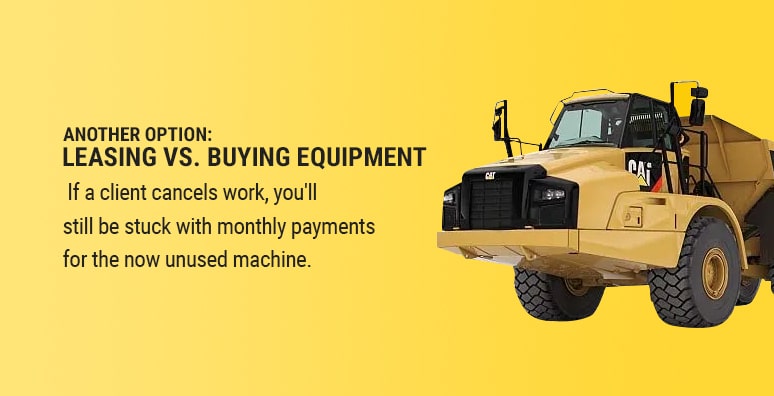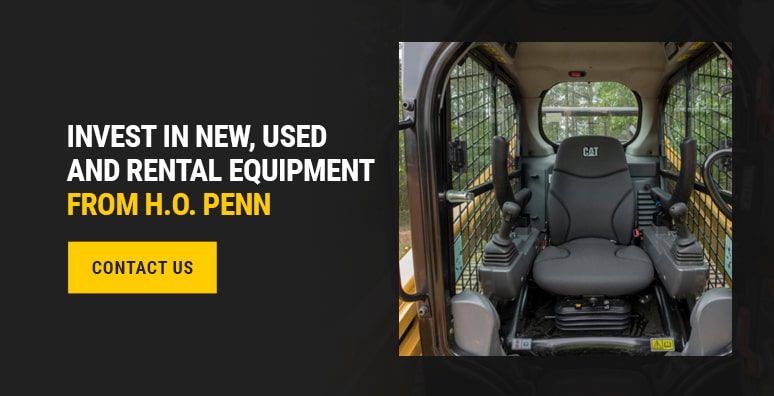Jump To Sections:
- Benefits of Renting Compact Construction Equipment
- Cons of Renting Compact Construction Equipment
- Benefits of Buying Compact Construction Equipment
- Cons of Buying Compact Construction Equipment
- Another Option: Leasing vs. Buying Equipement
- Renting vs. Buying Construction: What to Consider
- Invest in New, Used and Rental Equipment from H.O. Penn
Whether you’re looking to buy or rent skid steers or compact track loaders, the decision of how to acquire equipment is a tough one. There are many factors to consider, even aside from your company’s financial situation and budget.
The equipment you use helps you get the job done as best you can. Learn which option will help you meet the needs of your clients here.
Benefits of Renting Compact Construction Equipment
Let’s look at the advantages of renting compact construction equipment:
1. Use Specialty Equipment for One-Time Projects
When you rent compact construction equipment, you only pay for what you need, which could save you from having equipment sitting around your property unused. If you need unique equipment or the attachments (ie: hammers, augers, grapples, etc.), you may not own for a specific job, renting equipment might be better than buying it. You can make good use of the equipment during the rental period and give it back once the project is complete, saving you space in your facility and money.
2. Get Help With Maintenance Issues
If you face maintenance issues with your rental construction equipment, you won’t be responsible for dealing with it yourself. Instead, you can rely on the rental company to help you sort out and resolve concerns. Having a rental company to rely on for breakdowns and maintenance can alleviate pressure should parts fail or need fixing. The rental company will help you get the issue sorted so you can head back to the construction site quickly.
3. Gain Access to the Latest Tech
When you rent equipment, you gain access to the latest equipment technology. Construction equipment rental companies regularly update their inventory to ensure they’re offering the best options to customers. If you want to experiment with new tech — or are looking to purchase but want to give tech-heavy equipment a trial run — you may want to consider renting construction equipment.
4. Enjoy Tax Benefits
Rental expenses can be deducted annually as business expenses. When you rent, you won’t have to consider interest, insurance or depreciation. You can also avoid the sales tax associated with purchasing high-value equipment.
Cons of Renting Compact Construction Equipment
While renting construction equipment comes with many benefits, there are some potential drawbacks you’ll want to think about:
- Little flexibility: You may have to turn down jobs if you don’t have the right equipment to fulfill them. While acquiring rental equipment is usually quick, without your own fleet of equipment, you may miss out on jobs you could have otherwise taken.
- Doesn’t leave room for growth: If you want to grow your fleet, renting may not be the best option for your company, as renting does not leave room for expansion.
Benefits of Buying Compact Construction Equipment
Here are some of the most significant benefits of buying compact construction equipment outright:
1. See a Bigger Return on Machines You Use Regularly Over the Long Term
One of the most significant benefits of buying compact construction equipment is getting a better return on your investment. If you’re looking at equipment you know you’ll use almost daily for a long period, purchasing may be a better solution than renting.
Many companies will purchase equipment if they believe their utilization rate will exceed 60%. You can calculate the utilization rate by dividing the number of days you use the equipment by the total number of days in the measuring period.
For example, perhaps you’re torn between whether you should buy or rent a mini excavator and want to calculate the utilization rate of your current rental equipment. You’ve used your rental equipment 63 out of the past 90 work days. To find your utilization rate, divide 63 by 90, and multiply by 100. Your equipment utilization rate would be 70%, meaning it might be wise to purchase a mini excavator rather than continue renting.
2. Expand Your Fleet
If one of your company goals is to expand your fleet or your company assets, you should consider purchasing compact construction equipment. Fleet management is a whole new branch of your business, and if it’s a journey you want to take, you can buy equipment and start a new division to manage your growing fleet.
3. Take Advantage of Resale Opportunities
You may get a good resale value for your used construction equipment if you keep it in good condition. The opportunity to resell your equipment when you want to invest in newer versions or realize you don’t need specific equipment anymore is appealing to many businesses.
While you can’t guarantee what the market will look like when you try to resell your equipment or how much money you’ll receive, there’s always an audience looking for used construction equipment.
Cons of Buying Compact Construction Equipment
Note that some potential downsides to buying this kind of construction equipment include:
- Responsible for maintenance: When you purchase construction equipment outright, you’ll have to deal with the maintenance needs and any breakdowns or repairs yourself. This is when having a dedicated fleet management team is beneficial — without one, you might lose time dealing with machine performance issues.
- Equipment depreciation: Certain machines depreciate in value more quickly than others, making it essential to do diligent research before purchasing a machine that loses value quickly.
- Can’t deduct: Some tax deductions result from purchasing new equipment, but you can’t deduct the expenses associated with new equipment during the purchase year. Instead, your new equipment will be treated as a capital expense at tax time.
Another Option: Leasing vs. Buying Equipment
A bonus option for acquiring construction equipment is leasing. When you sign a lease, you’ll pay a fixed amount over an extended term, whether that’s 12 months or 48 months.
If you like rotating your fleet, leasing is an option you can consider. For example, if you notice you’re consistently renting the same machine for six months every year, you might consider leasing instead. The potential drawback of leasing compact construction equipment is you’re locked into the deal. If a client cancels work, you’ll still be stuck with monthly payments for the now unused machine.
Renting vs. Buying Construction Equipment: What to Consider
Here are the factors and associated questions you need to consider when deciding whether to purchase or rent construction equipment:
- Your budget and company’s financial situation: Are you in the financial position to purchase your own equipment and either manage the fleet yourself or outsource your fleet management? Would renting be a better investment?
- How long you need the equipment: Will you be using the equipment daily, or do you only need it for a specific project?
- How the market is behaving: Is the market in a place where you’ll have steady enough business to justify purchasing equipment, or is the market more volatile, making a “rent as you need” strategy more viable?
Invest in New, Used and Rental Equipment From H.O. Penn
H.O. Penn has the best selection of Cat® equipment in Connecticut and Southern New York. We offer comprehensive extended warranties, preventive maintenance plans and the largest selection of new and used replacement parts.
With over a century’s experience, we can help you find the new, used or rental equipment that best fits your needs. Find a location near you, or contact us to receive a free quote!


